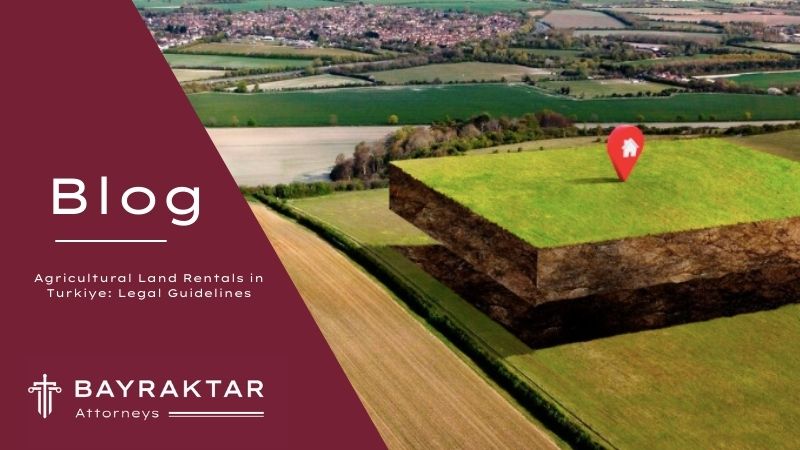
Foreign investors and individuals are increasingly drawn to Türkiye’s fertile agricultural lands for farming, agribusiness, or long-term investment. However, leasing farmland in Türkiye comes with specific legal considerations, particularly for foreigners. Understanding local laws, zoning rules, and regulatory obligations is essential to safeguard your investment.
At Bayraktar Attorneys, we provide legal guidance for foreigners seeking to rent agricultural land across Türkiye. Our services cover all stages of the transaction, from negotiating lease terms to ensuring full compliance with Turkish land and agricultural laws.
Legal Framework for Renting Agricultural Land
Under Turkish law, agricultural land can be rented either through written lease agreements or informal arrangements. For foreigners, a formal lease agreement that is notarized and properly registered is highly recommended.
While property ownership for foreigners is subject to limitations (e.g., size restrictions, proximity to military zones), leasing is typically more flexible, though still regulated by:
The Turkish Civil Code
The Law on Soil Conservation and Land Use
Environmental Law
Municipal Zoning Regulations
Foreigners are not prohibited from leasing farmland, but they must respect use limitations and cannot convert agricultural land into residential or industrial use without proper zoning permission.
Key Considerations Before Signing a Farmland Lease
Land Zoning and Use Permissions
Not all land in Türkiye is zoned for agricultural purposes. It’s critical to confirm that the plot is officially registered for farming, grazing, or similar activities. Our team performs detailed land registry checks through the General Directorate of Land Registry and Cadastre (Tapu ve Kadastro).
Duration of Lease Agreements
Agricultural lease terms are often aligned with harvest or production cycles. We typically advise contracts of 3–10 years, with automatic renewal clauses if both parties agree. Proper duration planning is essential for long-term cultivation investments such as olive groves or vineyards.
Cultivation and Crop Restrictions
Leased farmland may come with specific restrictions based on soil type, irrigation rights, or government programs (e.g., subsidies). Tenants may be restricted from using certain chemicals or growing water-intensive crops in protected zones.
Environmental and Sustainability Compliance
Türkiye imposes environmental compliance rules, particularly for larger plots or greenhouse-based operations. This includes water usage permits, waste management, and respecting conservation zones.
Common Disputes in Agricultural Leases
Disputes in farmland leases often relate to the following:
Crop damage or soil depletion
Non-payment of rent
Unauthorized subleasing
Early termination by either party
Use of land for unintended purposes (e.g., construction)
A well-drafted lease with clear dispute resolution clauses—preferably through Turkish courts or arbitration—is vital.
Our Legal Services for Agricultural Land Leasing
At Bayraktar Attorneys, we offer end-to-end legal support for foreign individuals and businesses, including:
Contract Drafting and Review: Ensuring terms reflect zoning limits, permitted use, duration, and exit terms.
Due Diligence: Verifying land title, zoning, environmental status, and ownership status.
Tax and Regulatory Compliance: Advising on property taxes, income reporting, and licensing.
Negotiation Support: Representing you in landlord discussions to secure fair rent and maintenance terms.
Dispute Resolution and Litigation: Representing you in case of contract violations or tenant-landlord disputes.
Final Thoughts
Renting agricultural land in Türkiye can be a rewarding venture, especially for foreign nationals interested in sustainable farming or long-term agribusiness investments. However, navigating the legal complexities requires experience and local knowledge.
Bayraktar Attorneys offers specialized legal services to ensure your lease agreements are secure, compliant, and tailored to your agricultural goals. Contact us today to learn how we can help you lease agricultural land confidently and legally in Türkiye.
Recently Added Blogs



.png)
.png)
.png)
.png)
